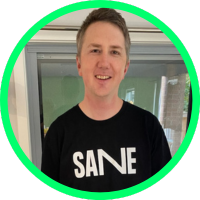The SANE Blog
Finding hope in community: the role of peer support in recovery
Peer Support played a key role in the early stages of my mental health recovery in a couple of ways. I was diagnosed with obsessive compulsive disorder (OCD) at the age of 21, however, I never spoke to my family and friends about my symptoms. Apart from my psychiatrist, I didn’t talk about my OCD to anybody.
At the age of 29, I became increasingly depressed and was diagnosed with co-morbid Major Depressive Disorder (MDD), leading to a long period out of the workforce.
It was at this time I began connecting with others living with OCD via online forums and attending an in-person support group each fortnight. I also became part of the SANE Peer Ambassador program. Meeting people who lived with OCD and understood was not only very comforting, but it also validated my experiences.
Talking about my OCD with my peers gave me the confidence to discuss symptoms with my parents, friendship group and employer. This was the key step that helped my depression lift, and eventually I got back to work.
Peer support still plays a big part in helping to manage my OCD. It often works to complement/enhance ongoing professional treatment.
For example, I recently completed a 3-week in-patient OCD treatment program at The Melbourne Clinic. There were eight other participants in the Exposure & Response Prevention (ERP) program.
Being among others with OCD meant I didn’t have to constantly explain myself; it provided a real sense of relief.
Since leaving the hospital I’ve stayed in touch with most of the group. It has helped me commit to the exposure exercises and remain hopeful during the inevitable fluctuations in symptoms.
I also now facilitate an anxiety support group once a month and find this very helpful and rewarding.
The main form of mental health support I’ve received over the years is regular sessions with my psychiatrist, includingbehavioural therapy and medication interventions.
I have benefited from the medical approach. However, for me, it is only partially helpful and has its limitations. I often feel a little frustrated that medicine can’t ‘cure’ my OCD. This is where the peer support is so valuable, to see how others have persevered with significant symptoms is very inspirational. The empathy shown is also something that can only be provided in a peer setting.
Whether it’s online via the SANE community forums or in person, being part of a peer support community provides me with a sense of belonging.
There’s no downtime with my OCD but connecting with others that understand truly does provide some rest. To live and work in a society that unfortunately still doesn’t understand is very isolating.
Those with similar experiences are the only ones who can say ‘I know’ or ‘I understand’. In some ways we’re moving forward together, each refusing to let the intrusive thoughts that define OCD control us. This provides a great source of motivation.
To me, hope is a belief in what’s possible, the stories of recovery and perseverance shared in the peer environment are a constant reminder of how someone can overcome their circumstances.
It reminds me whilst I have challenges, there’s more than one way to approach them.
Tim Hillier, SANE Peer Ambassador

Join the SANE community to connect with people who understand what you are going through, seek advice and surround yourself with support. We're free, anonymous, and professionally moderated 24/7. Click here to get started.
When you subscribe to the blog, we will send you an e-mail when there are new updates on the site so you wouldn't miss them.
